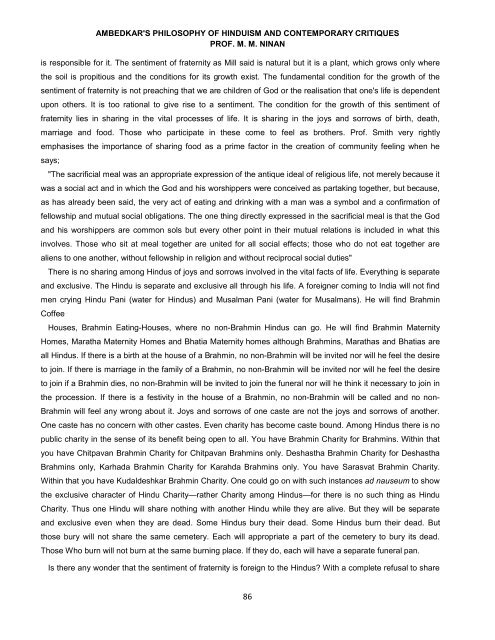Ambedkar-Philosophy of Hinduism
You also want an ePaper? Increase the reach of your titles
YUMPU automatically turns print PDFs into web optimized ePapers that Google loves.
AMBEDKAR'S PHILOSOPHY OF HINDUISM AND CONTEMPORARY CRITIQUES<br />
PROF. M. M. NINAN<br />
is responsible for it. The sentiment <strong>of</strong> fraternity as Mill said is natural but it is a plant, which grows only where<br />
the soil is propitious and the conditions for its growth exist. The fundamental condition for the growth <strong>of</strong> the<br />
sentiment <strong>of</strong> fraternity is not preaching that we are children <strong>of</strong> God or the realisation that one's life is dependent<br />
upon others. It is too rational to give rise to a sentiment. The condition for the growth <strong>of</strong> this sentiment <strong>of</strong><br />
fraternity lies in sharing in the vital processes <strong>of</strong> life. It is sharing in the joys and sorrows <strong>of</strong> birth, death,<br />
marriage and food. Those who participate in these come to feel as brothers. Pr<strong>of</strong>. Smith very rightly<br />
emphasises the importance <strong>of</strong> sharing food as a prime factor in the creation <strong>of</strong> community feeling when he<br />
says;<br />
"The sacrificial meal was an appropriate expression <strong>of</strong> the antique ideal <strong>of</strong> religious life, not merely because it<br />
was a social act and in which the God and his worshippers were conceived as partaking together, but because,<br />
as has already been said, the very act <strong>of</strong> eating and drinking with a man was a symbol and a confirmation <strong>of</strong><br />
fellowship and mutual social obligations. The one thing directly expressed in the sacrificial meal is that the God<br />
and his worshippers are common sols but every other point in their mutual relations is included in what this<br />
involves. Those who sit at meal together are united for all social effects; those who do not eat together are<br />
aliens to one another, without fellowship in religion and without reciprocal social duties"<br />
There is no sharing among Hindus <strong>of</strong> joys and sorrows involved in the vital facts <strong>of</strong> life. Everything is separate<br />
and exclusive. The Hindu is separate and exclusive all through his life. A foreigner coming to India will not find<br />
men crying Hindu Pani (water for Hindus) and Musalman Pani (water for Musalmans). He will find Brahmin<br />
C<strong>of</strong>fee<br />
Houses, Brahmin Eating-Houses, where no non-Brahmin Hindus can go. He will find Brahmin Maternity<br />
Homes, Maratha Maternity Homes and Bhatia Maternity homes although Brahmins, Marathas and Bhatias are<br />
all Hindus. If there is a birth at the house <strong>of</strong> a Brahmin, no non-Brahmin will be invited nor will he feel the desire<br />
to join. If there is marriage in the family <strong>of</strong> a Brahmin, no non-Brahmin will be invited nor will he feel the desire<br />
to join if a Brahmin dies, no non-Brahmin will be invited to join the funeral nor will he think it necessary to join in<br />
the procession. If there is a festivity in the house <strong>of</strong> a Brahmin, no non-Brahmin will be called and no non-<br />
Brahmin will feel any wrong about it. Joys and sorrows <strong>of</strong> one caste are not the joys and sorrows <strong>of</strong> another.<br />
One caste has no concern with other castes. Even charity has become caste bound. Among Hindus there is no<br />
public charity in the sense <strong>of</strong> its benefit being open to all. You have Brahmin Charity for Brahmins. Within that<br />
you have Chitpavan Brahmin Charity for Chitpavan Brahmins only. Deshastha Brahmin Charity for Deshastha<br />
Brahmins only, Karhada Brahmin Charity for Karahda Brahmins only. You have Sarasvat Brahmin Charity.<br />
Within that you have Kudaldeshkar Brahmin Charity. One could go on with such instances ad nauseum to show<br />
the exclusive character <strong>of</strong> Hindu Charity—rather Charity among Hindus—for there is no such thing as Hindu<br />
Charity. Thus one Hindu will share nothing with another Hindu while they are alive. But they will be separate<br />
and exclusive even when they are dead. Some Hindus bury their dead. Some Hindus burn their dead. But<br />
those bury will not share the same cemetery. Each will appropriate a part <strong>of</strong> the cemetery to bury its dead.<br />
Those Who burn will not burn at the same burning place. If they do, each will have a separate funeral pan.<br />
Is there any wonder that the sentiment <strong>of</strong> fraternity is foreign to the Hindus? With a complete refusal to share<br />
86


















